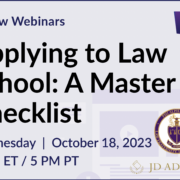LSAC’s Update on LSAT Testing Frequency: What Does It Mean?
LSAC’s Update on LSAT Testing Frequency: What Does It Mean?
LSAC recently change its LSAT testing frequency guidelines so that students can take the test multiple times in succession. What does this change mean for the average LSAT taker? Read further to find out!
1. What is the change to the LSAT testing frequency?
Starting with the September 2017 LSAT, students will not longer be limited to taking the LSAT three times in a two year period. Students can now register for every administration of the LSAT, regardless of the number of previous attempts. This is a major change from the previous policy, which only allowed 3 attempts in a tw0 year period.
2. Who benefits from the LSAT testing frequency change?
Simply put, those who did not prepare adequately for previous LSATs, or had unexpected events derail their testing days. So, if you took your first test on a whim, and then had something bad happen shortly before your second test day, you no longer have to worry about the third strike rule. Previously, if you didn’t ace the test on your third attempt, you would not be able to sit again for 2 years. Now, you can sit for your third attempt confident it will not be your last strike.
3. What changes does this have on the law school application process?
For years, law schools have not been required to average the LSAT scores of their 1L students and report it to the American Bar Association. However, this does not mean that you should take the test multiple times. Just because you can take the LSAT ten times doesn’t mean you should.
An admissions officer spoke about the change in rules at our recent mock LSAT. In her words, she loves when she sees students increase their score by a significant amount of points between their first and second attempt. To her, it showed a student fully invested in their success, willing to work hard to get into their dream school. It also spoke to their work ethic. However, too many attempts at the LSAT signaled, for her, that the student did not take preparation seriously. This is a major negative, since law school success relies upon independent preparation much more than undergraduate studies does.
4. Ultimately, how does this change affect me?
For most takers, this new rule should not change anything. The best advice is to take the LSAT as few times as possible. Not only is it annoying to have to sit for the exam again, but it could potentially project to law schools that you are not an ideal candidate for admission. However, for the rare cases where problems crept up, this takes the pressure off the third attempt. So, use it if you need it, but prepare so you won’t!
Pursuing Law School? We’ve Got You Covered!
🌟 Special Offer: Enroll in our FREE on-demand law school prep course, meticulously crafted by a top-ranked law student. Secure your spot now




